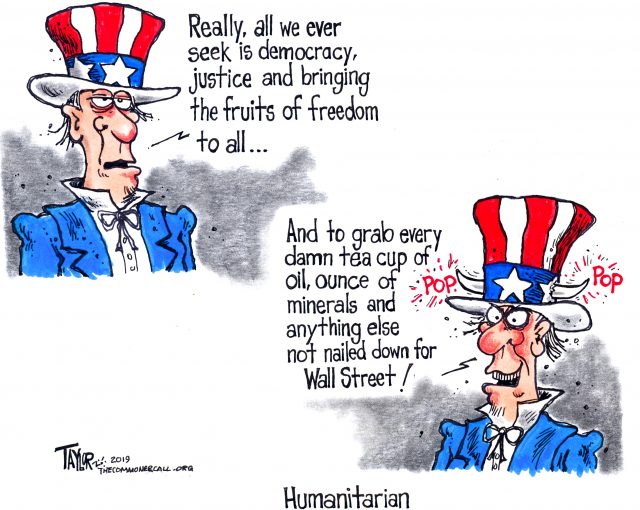This generation of Americans has already seen how our government’s endless sanctions, coups and wars have only left country after country mired in violence, poverty and chaos.
Since Killing Hope was published in 1995, the U.S. has conducted at least 13 more regime change operations, several of which are still active: Yugoslavia; Afghanistan; Iraq; the 3rd U.S. invasion of Haiti since WWII; Somalia; Honduras; Libya; Syria; Ukraine; Yemen; Iran; Nicaragua; and now Venezuela.
William Blum noted that the U.S. generally prefers what its planners call “low intensity conflict” over full-scale wars. Only in periods of supreme overconfidence has it launched its most devastating and disastrous wars, from Korea and Vietnam to Afghanistan and Iraq. After its war of mass destruction in Iraq, the U.S. reverted to “low intensity conflict” under Obama’s doctrine of covert and proxy war.
Obama conducted even heavier bombing than Bush II, and deployed U.S. special operations forces to 150 countries all over the world, but he made sure that nearly all the bleeding and dying was done by Afghans, Syrians, Iraqis, Somalis, Libyans, Ukrainians, Yemenis and others, not by Americans. What U.S. planners mean by “low intensity conflict” is that it is less intense for Americans.
While Venezuelans face poverty, preventable diseases, malnutrition and open threats of war by U.S. officials, those same U.S. officials and their corporate sponsors are looking at an almost irresistible gold mine if they can bring Venezuela to its knees.
President Ghani of Afghanistan recently revealed that a staggering 45,000 Afghan security forces have been killed since he took office in 2014, compared with only 72 U.S. and NATO troops. “It shows who has been doing the fighting,” Ghani caustically remarked. This disparity is common to every current U.S. war.
This does not mean that the U.S. is any less committed to trying to overthrowing governments that reject and resist U.S. imperial sovereignty, especially if those countries contain vast oil reserves. It’s no coincidence that two of the main targets of current U.S. regime change operations are Iran and Venezuela, two of the four countries with the largest liquid oil reserves in the world (the others being Saudi Arabia and Iraq).
Four tools of regime change
In practice, “low intensity conflict” involves four tools of regime change: sanctions or economic warfare; propaganda or “information warfare”; covert and proxy war; and aerial bombardment. In Venezuela, the U.S. has used the first and second, with the third and fourth now “on the table” since the first two have created chaos but so far not toppled the government.
The U.S. government has been opposed to Venezuela’s socialist revolution since the time Hugo Chavez was elected in 1998. Unbeknownst to most Americans, Chavez was well loved by poor and working class Venezuelans for his extraordinary array of social programs that lifted millions out of poverty. Between 1996 and 2010, the level of extreme poverty plummeted from 40% to 7%. The government also substantially improved healthcare and education, cutting infant mortality by half, reducing the malnutrition rate from 21% to 5% of the population and eliminating illiteracy. These changes gave Venezuela the lowest level of inequality in the region, based on its Gini coefficient.
Since Chavez’ death in 2013, Venezuela has descended into an economic crisis stemming from a combination of government mismanagement, corruption, sabotage and the precipitous fall in the price of oil. The oil industry provides 95% of Venezuela’s exports, so the first thing Venezuela needed when prices crashed in 2014 was international financing to cover huge shortfalls in the budgets of both the government and the national oil company. The strategic objective of U.S. sanctions is to exacerbate the economic crisis by denying Venezuela access to the U.S.-dominated international financial system to roll over existing debt and obtain new financing.
Doing as Nixon did
The blocking of Citgo’s funds in the U.S. also deprives Venezuela of a billion dollars per year in revenue that it previously received from the export, refining and retail sale of gasoline to American drivers. Canadian economist Joe Emersberger has calculated that the new sanctions Trump unleashed in 2017 cost Venezuela $6 billion in just their first year. In sum, U.S. sanctions are designed to “make the economy scream” in Venezuela, exactly as President Nixon described the goal of U.S. sanctions against Chile after its people elected Salvador Allende in 1970.
Alfred De Zayas visited Venezuela as a UN Rapporteur in 2017 and wrote an in-depth report for the UN. He criticized Venezuela’s dependence on oil, poor governance and corruption, but he found that “economic warfare” by the U.S. and its allies were seriously exacerbating the crisis. …
- Some Prominent Democrats Join With Trump, Media, CIA & War Criminal Elliot Abrams To Overthrow Nicolás Maduro & Steal Venezuela’s Oil — The Trump administration is openly engaging in a blatant effort to overthrow the government of Nicolás Maduro in Venezuela. It’s a campaign aimed at regime change, and it’s being publicly promoted as an opportunity to steal Venezuelan oil for the benefit of U.S. corporations. They’re not even pretending. … Link to Story and 9-Minute Video
(Commoner Call cartoon by Mark L. Taylor, 2019. Open source and free for non-derivative use with link to www.thecommonercall.org )
*****
NATIONAL MARCH ON WASHINGTON SATURDAY, MARCH 16: HANDS OFF VENEZUELA!
NOTE: Sign the petition HERE to tell your elected officials NO US-ENGINEERED COUP In Venezuela!



